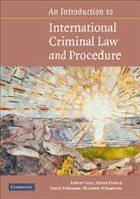This textbook explores international criminal law and its application to domestic prosecutions of international crimes.
International criminal law has developed considerably in the last decade and a half, resulting in a complex and re-invigorated discipline. This has impacted directly on the popularity of the study of the subject, particularly on postgraduate law degrees. This textbook serves these courses by providing an introduction to the principles of international criminal law and processes. Written by four international lawyers with experience of teaching international criminal law, it is accessible yet sophisticated in its approach. It covers substantive international criminal law, the institutions designed to enforce it and their procedures, and the international law applicable to domestic prosecutions of international crimes. It will be essential reading for students and teachers of international criminal law. In addition, practitioners and researchers in the field (and in related fields such as criminal law), students of international law and international relations will find this introduction invaluable.
Table of contents:
1. What is international criminal law?; 2. The objectives of international criminal law; 3. Jurisdiction; 4. National prosecutions of international crimes; 5. State Cooperation with respect to national proceedings; 6. The history of international criminal prosecutions: Nuremberg and Tokyo; 7. The ad hoc international criminal tribunals; 8. The International Criminal Court; 9. Other courts with international elements; 10. Genocide; 11. Crimes against humanity; 12. War crimes; 13. Aggression; 14. Transnational crimes, terrorism and torture; 15. General principles of liability; 16. Defences/grounds for excluding criminal responsibility; 17. Procedures of international criminal investigations and prosecutions; 18. Sentencing, penalties and reparations to victims; 19. State cooperation with international courts and tribunals; 20. Immunities; 21. Conclusions: the future of international criminal law.
International criminal law has developed considerably in the last decade and a half, resulting in a complex and re-invigorated discipline. This has impacted directly on the popularity of the study of the subject, particularly on postgraduate law degrees. This textbook serves these courses by providing an introduction to the principles of international criminal law and processes. Written by four international lawyers with experience of teaching international criminal law, it is accessible yet sophisticated in its approach. It covers substantive international criminal law, the institutions designed to enforce it and their procedures, and the international law applicable to domestic prosecutions of international crimes. It will be essential reading for students and teachers of international criminal law. In addition, practitioners and researchers in the field (and in related fields such as criminal law), students of international law and international relations will find this introduction invaluable.
Table of contents:
1. What is international criminal law?; 2. The objectives of international criminal law; 3. Jurisdiction; 4. National prosecutions of international crimes; 5. State Cooperation with respect to national proceedings; 6. The history of international criminal prosecutions: Nuremberg and Tokyo; 7. The ad hoc international criminal tribunals; 8. The International Criminal Court; 9. Other courts with international elements; 10. Genocide; 11. Crimes against humanity; 12. War crimes; 13. Aggression; 14. Transnational crimes, terrorism and torture; 15. General principles of liability; 16. Defences/grounds for excluding criminal responsibility; 17. Procedures of international criminal investigations and prosecutions; 18. Sentencing, penalties and reparations to victims; 19. State cooperation with international courts and tribunals; 20. Immunities; 21. Conclusions: the future of international criminal law.
'It is definitely a challenge to write a textbook on a quickly developing area such as international criminal law. Cryer et al. have succeeded in accomplishing this daunting task. The fourth edition of Introduction to International Criminal Law and Procedure navigates between reflecting the state of the art and presenting informed opinions on the latest developments. A must-read for anyone interested in the topic.' Harmen van der Wilt, Universiteit van Amsterdam

